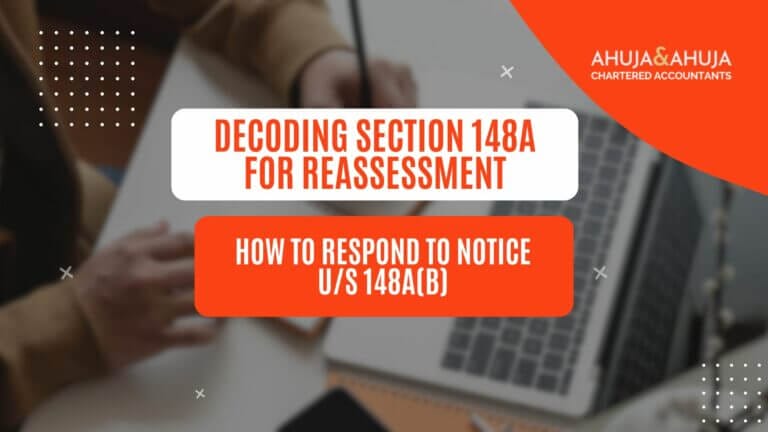Section 80-IAC of Income Tax: Exemption to Startups from Income Tax – A Detailed Analysis
India, a burgeoning hub of innovation and entrepreneurship, has witnessed a remarkable surge in startups over the past few years. Recognizing the potential of these startups in driving economic growth and creating jobs, the Indian government launched the Startup India Initiative in 2016.
This flagship initiative aims to build a robust ecosystem that is conducive for the growth of startup businesses, to drive sustainable economic growth and generate large scale employment opportunities.
One of the cornerstones of this initiative is Section 80-IAC of the Income Tax Act, which provides significant tax reliefs to qualifying startups, helping them conserve precious capital and invest in their growth.
This specific provision allows eligible startups to claim a deduction of a hundred percent on their profits, ensuring their innovative ventures have the financial backing needed to expand and thrive.
The government’s pro-business stance, combined with a comprehensive support system, has made the idea of building a startup in India more attractive than ever before. It’s crucial for young entrepreneurs and founders to understand these benefits, and that’s precisely where our focus lies today.
In this article, we will decode Section 80-IAC in the simplest terms and guide startups on how to leverage these tax benefits.
Whether you’re taking your first entrepreneurial step or are on the verge of scaling your business, grasping the intricacies of this tax provision can significantly bolster your financial planning.
What is Section 80-IAC?
Let’s break down Section 80-IAC for easy comprehension. In essence, it’s a part of the Income Tax Act that empowers eligible startups to reduce tax liabilities, thereby encouraging them to steer resources towards innovation and business expansion.
The section grants a 100% deduction on profits and gains from eligible business activities for three consecutive years within a ten-year period following a company’s incorporation.
This tax exemption provision mirrors the government’s commitment to foster a culture of entrepreneurship. For startup founders, it’s not just a tax benefit; it’s a sign of the government’s faith in their potential to contribute to the nation’s progress.
Eligibility Criteria for Startups
To be considered for this exemption, startups must meet specific criteria set by the government. Here’s a look at the eligibility requirements:
- The startup must be recognized as an eligible startup under the Startup India scheme.
- It must be a company or a limited liability partnership (LLP) engaged in activities that align with the definition of an ‘eligible business.’
- Inclusion criteria extend to those startups that are innovative and have a scalable business model with high potential for job creation or wealth generation.
- The startup should not have been formed by the splitting up or reconstruction of an existing business, except under specific circumstances.
- It must not be created from the transfer of old machinery or plant, with some exceptions as per Explanation 2 of the Act.
It’s important to navigate these conditions carefully to ensure that your startup qualifies for the tax incentives without any hiccups.
In our subsequent sections, we will delve deeper into the intricacies of the tax exemption benefits, the procedure to claim these deductions, and address frequently asked questions, providing a road map to make the most out of Section 80-IAC.
Stay tuned as we unravel how startups can effectively reduce their tax burden and channel their earnings back into their business, important issues such as the taxability of ESOPs, and much more.
If you’d like to learn and understand more about setting up a business or require guidance on the nuances of company formation and LLP registration for your burgeoning venture, feel free to connect with us at Ahuja & Ahuja Chartered Accountants, where we can cater to all your business needs.
Tax Exemption Benefits under Section 80IAC
The tax exemption benefits offered under Section 80-IAC are undeniably attractive for startups. By availing this provision, startups can enjoy a 100% deduction on the profits and gains derived from their eligible business activities.
However, it’s essential to understand the nuances of these benefits to make informed financial decisions. Here’s a closer look at the key aspects:
1. Duration of Exemption:
According to the provisions of Section 80-IAC, qualifying startups can avail of the tax exemption for three consecutive assessment years. This exemption is typically claimed at the option of the assessee, allowing flexibility in choosing the most advantageous years out of a ten-year period starting from the year of incorporation.
2. Transfer of Machinery or Plant:
The Act restricts startups from forming a new business while transferring machinery or plant previously used for any purpose. However, there are exceptions to this rule. As per Explanation 2 of the Act, if the total value of the machinery or plant transferred does not exceed 20% of the total value of the machinery or plant used in the business, the condition will be deemed complied with.
Understanding these benefits and conditions can help startups optimize their tax planning strategies to make the most of the available deductions. Proper utilization of tax benefits under Section 80-IAC can significantly contribute to the growth and expansion of startups.
In the next section, we will provide a step-by-step process to help startups claim the tax exemption under Section 80-IAC. By following this process diligently, startups can ensure they fulfill the necessary requirements and take advantage of the tax benefits to fuel their entrepreneurial journey.
Step-by-Step Process to Claim the Exemption
To claim the tax exemption under Section 80-IAC, startups need to follow a systematic process. Here’s a step-by-step guide to help you navigate the procedure effectively:
Step 1: Register under the Startup India Initiative
Before you can avail the tax benefits, it is crucial to register your startup under the Startup India initiative. Visit the official Startup India portal and complete the registration process by providing the necessary details about your business.
Step 2: Obtain the Certificate of Eligible Business
To qualify for the tax exemption, startups need to obtain a certificate of an eligible business from the Inter-Ministerial Board of Certification.
The Central Government notifies this board in the Official Gazette. The certification process involves providing relevant documents and information about your startup’s eligibility and business activities.
Step 3: File for the Tax Exemption
Once you have successfully obtained the certificate, it’s time to file for the tax exemption under Section 80-IAC.
Include the necessary details and supporting documents in your income tax return for the relevant assessment year. Ensure accuracy and compliance with the requirements specified by the tax authorities.
By following these steps diligently, startups can claim the tax exemption effectively and ensure they maximize the benefits provided by Section 80-IAC.
It’s essential to stay updated with any changes or amendments in the tax laws and regulations to maintain compliance while enjoying the tax benefits.
Do’s and Don’ts for Startups Claiming Exemption
While claiming the tax exemption under Section 80-IAC, it’s crucial for startups to keep certain do’s and don’ts in mind to ensure a smooth and hassle-free process. Here are some guidelines to follow:
Do’s:
- Maintain Proper Records: Keep accurate records and documentation of your startup’s financial transactions, eligible business activities, and compliance with the conditions specified under Section 80-IAC.
- Seek Professional Assistance: Engage the services of a qualified chartered accountant or tax consultant specializing in startup taxation to ensure compliance and optimize your tax planning strategies.
- Stay Updated: Regularly review and stay updated with any changes or amendments to tax laws and regulations that may impact your startup’s eligibility or tax benefits under Section 80-IAC.
- File Timely Returns: Ensure timely filing of your income tax returns, including the necessary details and supporting documents related to the tax exemption claimed under Section 80-IAC.
- Communicate with Tax Authorities: Maintain effective communication with the tax authorities and promptly respond to any inquiries or requests for additional information during the assessment process.
Don’ts:
- Misrepresent Information: Avoid providing inaccurate or false information about your startup’s eligibility or financial details while claiming the tax exemption. Misrepresentation can have legal and financial implications.
- Overlook Compliance Requirements: Ensure compliance with all the conditions specified under Section 80-IAC, including the eligibility criteria and limitations on the transfer of machinery or plant.
- Delay in Seeking Certification: Begin the process of obtaining the certificate of eligible business from the Inter-Ministerial Board promptly. Delays can impact the timing of claiming the tax exemption.
- Neglect Accounting Practices: Maintain accurate and up-to-date accounting records and follow proper accounting practices to support your startup’s financial transactions and eligibility for the tax exemption.
By adhering to these do’s and don’ts, startups can navigate the process of claiming the tax exemption smoothly and ensure compliance with the provisions of Section 80-IAC.
Case Studies/Examples
To further illustrate the practical application of Section 80-IAC and its potential benefits for startups, let’s explore some case studies and examples:
Case Study 1: Tech Innovators Pvt. Ltd.
Tech Innovators Pvt. Ltd. is a startup incorporated in 2018, focused on developing cutting-edge software solutions in the healthcare industry. The company meets all the eligibility criteria under Section 80-IAC, and its total turnover for the previous year is well below the threshold of one hundred crore rupees.
Tech Innovators obtained the certificate of eligible business from the Inter-Ministerial Board and successfully claimed the tax exemption for the consecutive assessment years 2019-2022.
As a result, the company saved a significant amount in taxes, allowing them to allocate more funds towards research and development, hiring skilled professionals, and expanding market reach.
Case Study 2: Green Energy Solutions LLP
Green Energy Solutions LLP, a renewable energy startup incorporated in 2020, focuses on providing sustainable and eco-friendly energy solutions. The LLP obtained the necessary certification and opted to claim the tax exemption for the consecutive assessment years 2021-2023.
By availing the 100% deduction under Section 80-IAC, Green Energy Solutions LLP successfully reinvested a substantial portion of their profits into acquiring advanced equipment, training their workforce, and scaling their operations.
This tax benefit acted as a catalyst for their growth and propelled their mission of promoting a greener and more sustainable future.
These case studies highlight the tangible advantages startups can enjoy by leveraging the tax exemption benefits under Section 80-IAC.
Such benefits empower startups to allocate their financial resources strategically, foster innovation, and contribute to the overall development of the economy.
Frequently Asked Questions (FAQs)
As we explore the nuances of Section 80-IAC and its implications for startups, it’s essential to address some frequently asked questions related to this tax provision. Here are the answers to some common queries:
What does “eligible business” mean under Section 80-IAC?
“Eligible business” refers to a business carried out by an eligible startup engaged in innovation, development, improvement of products or processes, services, or a scalable business model with a high potential for employment generation or wealth creation.
How can a startup obtain a certificate of eligible business?
Startups need to apply for and obtain a certificate of eligible business from the Inter-Ministerial Board of Certification. The Central Government notifies this board in the Official Gazette. The certification process involves providing relevant documents and information about the startup’s eligibility and business activities.
Can a startup claim the tax exemption if it uses second-hand machinery?
According to Explanation 2 of Section 80-IAC, if a startup transfers machinery or plant previously used for any purpose to a new business, the total value of the transferred machinery or plant must not exceed 20% of the total value of machinery or plant used in the business. If this condition is satisfied, the startup can claim the tax exemption.
These FAQs aim to provide clarity on the key aspects of Section 80-IAC. It’s crucial for startups to have a comprehensive understanding of these provisions to ensure compliance and optimize their tax planning strategies.
Conclusion
Section 80-IAC of the Income Tax Act has emerged as a game-changer for startups in India. Through this provision, the government aims to foster a conducive environment for innovation, job creation, and wealth generation.
By offering a 100% deduction on profits and gains derived from eligible business activities, startups can conserve essential capital and reinvest it in research, development, scaling operations, and talent acquisition. This tax exemption acts as a catalyst for the growth and success of startups, enabling them to unlock their full potential.
Startups are encouraged to leverage the benefits of Section 80-IAC by fulfilling the eligibility criteria, obtaining the certificate of eligible business, and adhering to the compliance requirements.
Proper documentation, timely filing of tax returns, and staying informed about any changes in tax laws are vital elements of availing and maximizing the tax benefits offered under this provision.
In conclusion, entrepreneurs and founders embarking on their startup journey should recognize the significance of Section 80-IAC and capitalize on this opportunity to propel their business forward.
By understanding and utilizing the tax exemption benefits effectively, startups can navigate the financial landscape with confidence, contributing to the growth of the startup ecosystem and the nation’s overall development.
Remember, as you embark on your entrepreneurial journey, it is crucial to have a strong foundation in financial literacy. Be proactive in seeking guidance from professionals and leveraging tools and resources for financial management.
By building a solid understanding of taxation and financial intricacies, startups can optimize their operations and make informed decisions for sustained success.
Note: The information provided in this article is for general informational purposes only and should not be construed as professional advice. It is advisable to consult with a qualified tax consultant or chartered accountant for personalized guidance based on your specific circumstances.
Disclaimer
The materials provided herein are solely for educational and informational purposes. No attorney/professional-client relationship is created when you access or use the site or the materials. The information presented on this site does not constitute legal or professional advice and should not be relied upon for such purposes or used as a substitute for professional or legal advice.





